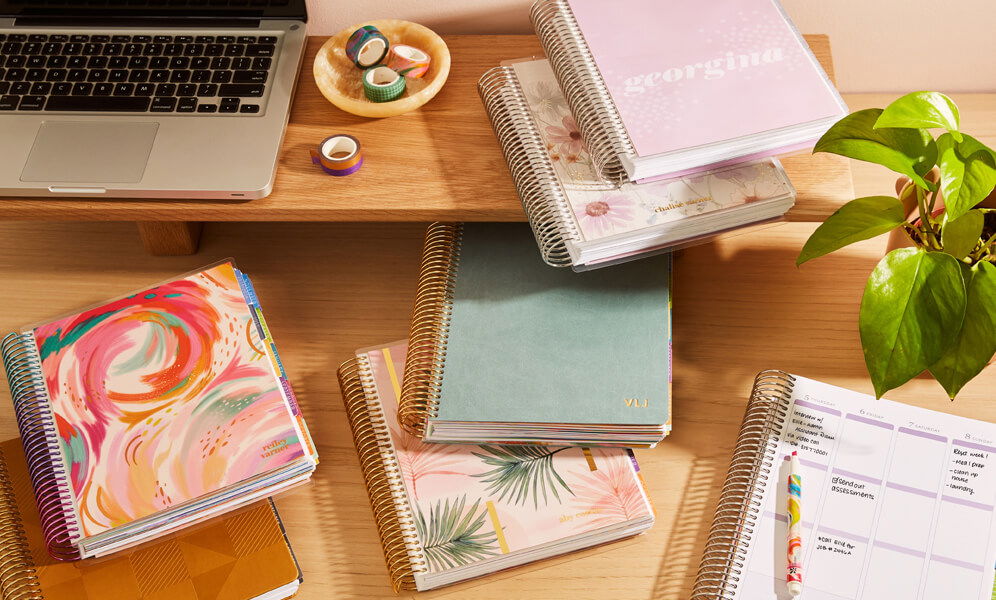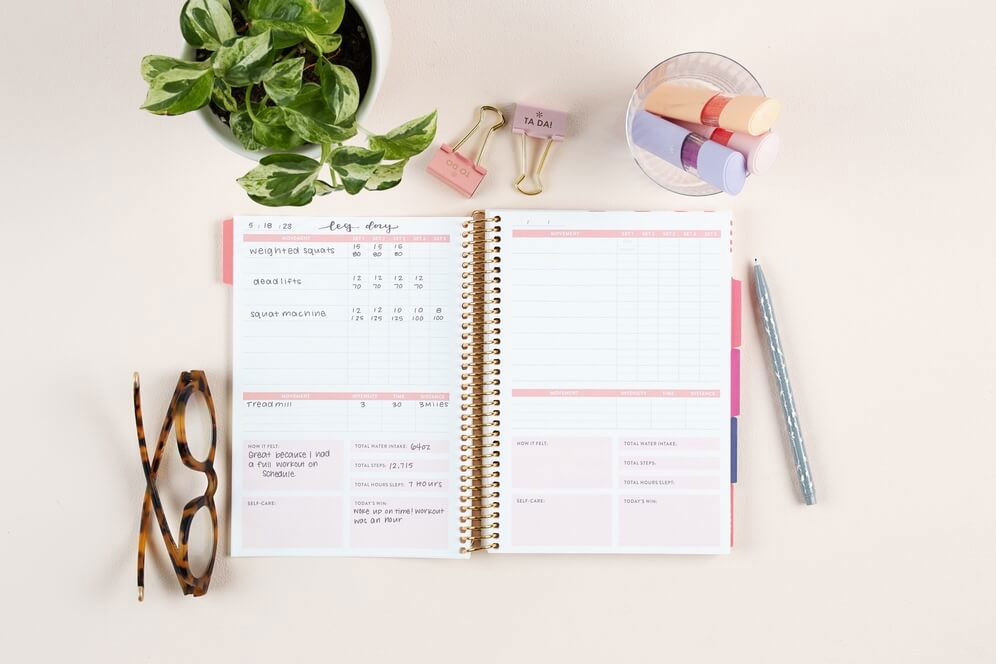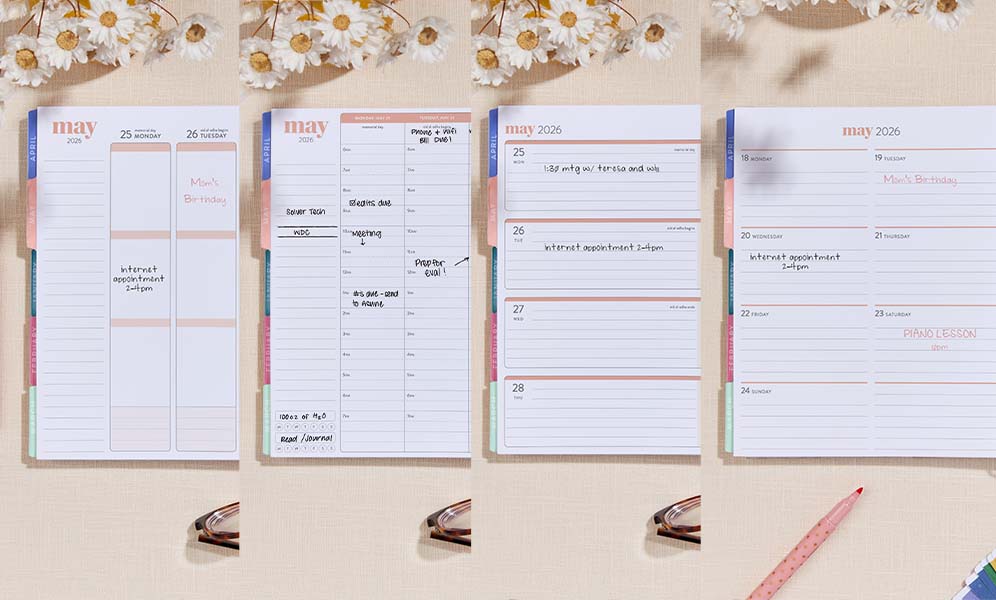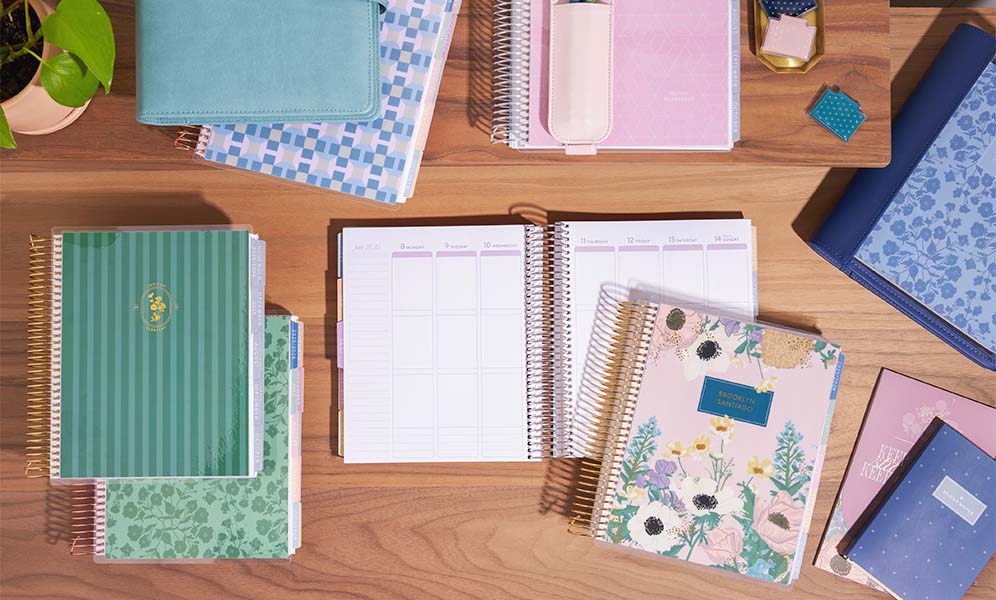11 Different Planner Types Explained + How to Choose

Ever find it hard to keep track of everything you need to do – whether it’s an endless to-do list in your head or fragmented tasks spread across multiple apps? With so many different tasks and appointments to juggle, it's easy to get overwhelmed and fall behind. That's where a paper planner comes in. Despite the rise of digital tools, paper planners are still incredibly popular and effective … and for good reason. In fact, many people find that using a paper planner helps them reduce stress, focus, stay organized, set goals, prioritize tasks, and track their progress.
One of the great things about paper planners is that there are so many different options available. From academic planners to bullet journals, there is an agenda out there for every type of personality, planning level, organizing need, and style.
Ready to find your optimal organizer? Let’s jump in and explore 11 different types of planners, their unique features and page options, and how to choose the right one for you.
11 Different Types of Planners

While there are four different types of planning (operational, tactical, strategic, and contingency), there are many more different types of planners you can use to implement one or all planning to meet your needs.
1. Life Planners or Personal Planners
Life planners or personal planners are designed to help you manage your personal life – no matter how full and complex it is. They typically include pages for daily, weekly, and monthly planning, as well as sections for goal setting, habit tracking, and gratitude journaling. Life organizers are perfect for people who want to keep track of their personal appointments and tasks in one place. The best life planners are designed to help you stay focused on your goals and build healthy habits while also organizing every aspect of your life, from family scheduling to financial planning, staying organized at work, and everything in between.
2. Academic Planners
Academic planners are designed for students (usually from middle school through post-grad and even trade school students). They typically have pages for scheduling classes, recording assignment due dates, tracking projects and exams, logging homework, and more. Some academic planners also include pages for note-taking and extracurricular activities. School agendas can help students stay on top of their coursework, meet assignment deadlines, and achieve academic success.
3. Teacher Lesson Planners
Teacher lesson planners are specifically designed for educators. They tend to include pages for planning lessons, recording attendance, logging communications with students and parents, tracking student progress, even note pages for journaling, reminders, and more. Some teacher lesson planners also have space for recording parent-teacher conferences and professional development goals. Teacher lesson planners can help educators stay organized, plan engaging lessons, and track student progress.
4. Health and Fitness Planners

Health and fitness planners are designed to help you meet your workout goals, prioritize your self-care, log fitness routines and habits, and monitor your overall health and wellness. They typically include pages for recording meals (or meal planning and food journaling), tracking water intake, and logging workouts. Some health and fitness journals also include pages for goal setting and progress tracking. Health and fitness organizers can help you stay on track with your wellness goals and maintain a healthy lifestyle.
5. Planners for Families
Planners for families are designed to help parents set family goals and keep the whole family organized. They typically include space for managing your family's schedule and activities, meal planning, and work-life balance. You can customize a LifePlanner™ or Monthly Planner to focus on family organization, or you can add-on special planning inserts into your planner specifically for family planning. Family calendar planners are also a screen-free way to connect as a family unit and work together to keep everyone organized and on schedule.
6. Work Planners
Work planners are designed for professionals. They typically include pages for scheduling meetings, recording deadlines, and tracking project progress. Some work agendas also include space for note-taking and goal setting. They can help professionals stay on top of their responsibilities and meet their career goals.
To learn more, check out How to Stay Organized at Work with the LifePlanner™ and the Best Business Planners for Owners and Entrepreneurs.
7. Wedding Planners
Wedding planner books are designed for brides and grooms to plan their big day. They typically include sections for recording vendor information, tracking budgets, and planning the ceremony and reception. Some wedding calendar organizers also have space for recording gift information and writing thank-you notes. Wedding planners can help couples stay organized and focused during the wedding organizing process.
8. Bullet Journals
Bullet journals allow you to create your own page layouts and designs. They typically include pages for daily, weekly, and monthly planning, as well as space for goal setting, habit tracking, and journaling. With bullet journals, you can create a planner that is perfectly tailored to your unique planning style and needs. Bullet journals are perfect for people who enjoy creative expression and want to have complete control over their planner's design.
Get fun, creative Bullet Journal Page Ideas to explore this planner type more!
9. Daily and Weekly Planners

Daily planners and weekly planners are designed for those who prefer to plan on a smaller scale. They typically include pages for planning each day or week, as well as space for goal setting and to-do lists. Daily and weekly organizers are perfect for people who want to keep their planning simple and focused.
Learn more about the Daily LifePlanner™ vs. Weekly LifePlanner™ + tips and planning prompts for each.
10. Monthly Planners
Monthly planners are designed for those who prefer to plan on a larger scale. They typically include sections for each month, as well as space for goal setting and tracking monthly tasks and events. Monthly planners are perfect for people who want to have a broad overview of their schedule and goals.
You may also enjoy these helpful tips for Daily, Weekly, and Monthly Planning.
11. Digital Planners
Digital organizers are typically designed for use on tablets or other electronic devices as apps and offer features like syncing with other digital tools and the ability to add multimedia elements like images and videos. While digital planners are becoming increasingly popular in today's digital age, using the best of both digital and paper planners is a growing trend as many seek ways to reduce screen fatigue.
Related: Learn the pros and cons of a planner vs. calendar and how to choose the right tool for your needs.
How to Choose the Right Planner for You
Choosing the right agenda can seem overwhelming, but it doesn't have to be. Here are some factors to consider when choosing from many options:
How Much Space Do You Need?
If you have a lot of appointments and tasks to keep track of, you may want a planner with plenty of space for daily or weekly planning. If you prefer to plan on a larger scale, a monthly planner may be a better fit for you. Consider your needs and how much space you will need to stay organized.
What Do You Want to Achieve?
Think about your goals and what you want to accomplish with your planner. If you want to focus on your health and fitness, a health and fitness planner may be the best option. If you're a student, an academic planner can help you stay on top of your coursework and achieve academic success. If you, or someone you know, is looking for an organizer to support a structured daily routine, while helping to improve focus and reduce anxiety, you may want to check out the best planner for ADHD. Consider your personal goals and how a calendar organizer can help you achieve them.
What Is Your Preferred Layout?

Consider how you prefer to organize your tasks and appointments. Some planners have hourly schedules, while others have sections for to-do lists and notes. Think about what layout would work best for you and your planning style.
Explore more planner layouts + get tips and planning prompts for each:
- Daily LifePlanner™ vs. Weekly LifePlanner™ (exclusively LifePlanners)
- Daily vs. Weekly Planner: Find Your Perfect Match (all daily and weekly planners)
- How to Plan in a Vertical Weekly LifePlanner™ + 10 Creative Planner Prompts
- How to Plan in a Dashboard LifePlanner™ + 10 Creative Dashboard Planner Prompts
- How to Plan in a Horizontal Weekly LifePlanner™ + 10 Creative Planner Prompts
- How to Plan in an Hourly LifePlanner™ + 10 Creative Planner Prompts
Will You Be Carrying the Planner With You or Leaving It At Your Desk?
If you need to take your organizer with you on the go, consider a smaller one that can fit in your bag or backpack or a ring agenda planner that doubles as a portable folio. If you'll primarily be using your agenda at your desk, a larger one may be a better option. Consider your lifestyle and where you will be using your planner most often.
What Style and Design of Planner Appeals to You?

Your planner is a reflection of your personal style, so choose one that speaks to you. Whether you prefer bright colors, elegant designs, or minimalist layouts, there is a planner out there for every style. Consider your personal style and how you want your planner to look and feel.
No matter what your planning needs are, there is a planner out there that will work for you. With so many different types of planners available, it's important to consider factors like space, goals, portability, page options, and design when choosing the right one to meet your needs. Explore the best sellers of the types of organizers we discussed above and discover a wide selection that is perfect for every personality, planning level, organizing need, and style. Once you find your preferred planner, enhance it with a variety of accessories to make your planner even more personalized and effective.
Remember, the key to successful planning is finding an agenda that works for you and your unique needs. Take the time to consider what type of calendar organizer would best suit your lifestyle and goals. With the right one, you can stay organized, achieve your goals, and stay on top of your schedule. Find the best planner for you and start planning (and living!) a more meaningful, intentional life.
Related Planning Guides
You may also enjoy these other popular, guided planning tips, prompts, and inspiration from our Erin Condren experts:
- Daily vs. Weekly Planner: Find Your Perfect Match
- How to Use a Weekly Planner: Time Management Made Easy
- Academic Planner 101: How to Use a Planner for School
- Best Planners (for every goal, style, and schedule)
- Your Guide to Different Planner Sizes + How to Choose
- Daily 5-Minute Planner Check-Ins: 60 Planner Prompts to Inspire + Motivate Your Planning Journey
- How to Organize Your Planner
- Daily, Weekly, Monthly Planning Tips
- Family Reunion Planning Guide: 10 Steps to the Perfect Event
- Top 20 Planning Tips from Erin Condren Experts
- How to Use an Undated Planner + Prompts
- How to Use Multiple Planners